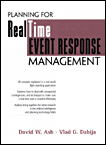
Planning
For Real Time Event Response Management
by David Ash
Excerpt From Planning For Real Time Event Response
Management
The
first question to be answered is "why plan?" The need
for planning was recognized thousands of years ago. Sun Tzu,
in his classic book The Art of War, written 2500 years
ago, said: "The general who wins a battle makes many calculations
in his temple before the battle is fought." Some of the
early successes in artificial intelligence were attained without
the need for planning. For example, chess-playing programs and
expert systems (Shortliffe, 1976 among many others) do not require
any type of planning. The answer, we feel, is that any intelligent
agent capable of carrying out a sequence of actions is going
to need to be able to plan. Chess-playing programs, while they
may look several moves ahead as part of a heuristic search algorithm,
do not actually plan more than one move ahead at a time. A simple
expert system, after making all inferences possible based on
available data, generally makes a single recommendation or diagnosis,
and leaves the planning of a complex response up to the human
agent who receives the recommendation.
We believe that such systems are quite limited in that they
require human intervention after each step. When an agent has
a more sophisticated ability to plan, it is capable of interacting
with a human at any time the human would so desire, but it is
no longer limited by the requirement for such interaction. For
example, an expert system with the ability to plan would be
able to recommend a plan of action based upon available data.
That plan could include gathering new data at appropriate intervals,
making further inferences, and doing further planning, based
upon such new data.
%20of%20titlemain.gif)
%20of%20titlemain.gif)